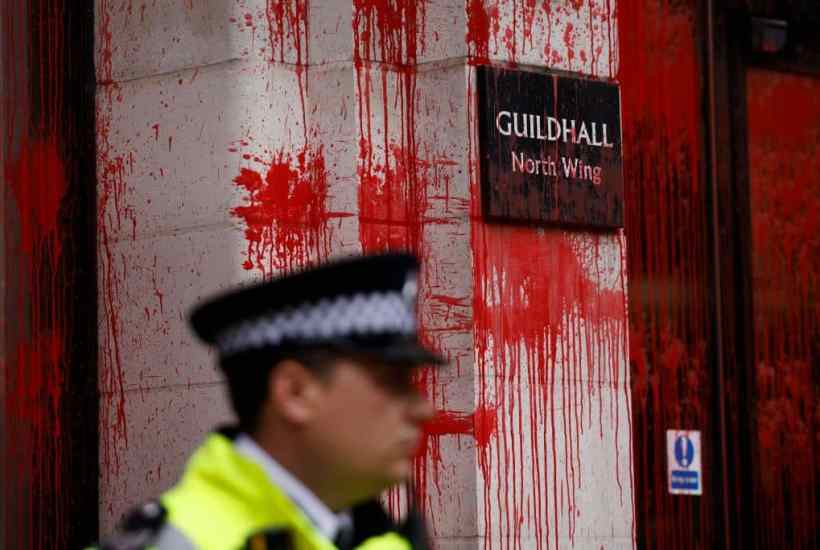Boris Johnson is rightly facing the wrath of Tory MPs over the proposed introduction of vaccine passports, but another piece of legislation put forward by the government should also trouble us. Critics of Boris Johnson’s Police, Crime, Sentencing and Courts Bill, often focus on its scale. They have a point. The Bill is simply enormous: made up of 13 parts, 179 clauses and hundreds of pages, parliamentarians of all stripes have treated it as a Christmas tree, hanging on it an endless array of special interest amendments. But size isn’t the Bill’s biggest problem. Even if heavily amended, this act – which is going through parliament today and is set to become law next year – threatens to criminalise ordinary Brits. It also points to another worrying trend: those in power are overstepping the mark by seeking to legislate on issues that don’t require legislation. Individuals should be largely free to make choices based on conscience, not fear of legal sanction. Why don’t the Tories understand this?
The policing Bill has been painted as vital by the likes of Priti Patel, yet the reality is rather different. Put simply, this law could empower the police to stop and search you without suspicion, based on a potential protest in your area. It also criminalises the act of attaching yourself to a public building. Though that tactic may have been recently abused by XR protesters, it has historically been popular with those with legitimate grievances, such as the Suffragettes and opponents of Heathrow expansion. Removing this right for all of us is a draconian response to a few eco-crusties gluing themselves to motorways.
The Tories clearly want to appear tough on crime but criminalising people who wish to vent their unhappiness in a democracy isn’t the way to do so. After all, if there is a crime crisis, it is surely because pre-existing laws aren’t being properly enforced. Coppers seem more interested in scouring Twitter for alleged hate speech and parading their own woke credentials on Instagram than hauling protestors off motorways. Even when brute force is actually deployed, it is highly inconsistent: kid gloves for BLM, but not for anti-lockdown demonstrations or the Sarah Everard vigil. The police are often clueless about using the powers they already possess. Why does Priti Patel want to hand officers further powers that they don’t need?
The government has consistently claimed the Bill is not an attack on the basic right to protest. Instead, the Home Secretary insists she is representing those members of the public frustrated by the wanton destruction of statues and widespread disruption to people’s lives carried out by BLM, Extinction Rebellion, and Insulate Britain over the last two summers. It’s true that lots of us have had enough of such actions: we sympathise with drivers begging protestors to let them get to work, or even parents trying to get their sick children to hospital. Clearly the law has failed when citizens are forced to step in and drag protestors away while the police stand idly by.
Don’t get me wrong: I’m no fan of these misanthropic XR narcissists, whose anti-democratic approach centres on bullying the majority into agreeing with their hairshirt approach to green policy. But the Bill will do nothing to tackle these forms of eco-extremism. Criminal damage, obstructing highways, hindering emergency vehicle are all already against the law already. So why not demand that the police properly enforce these measures rather than enact daft new legislation? Even Cressida Dick, the Commissioner of the Metropolitan Police, recently conceded she believed she had sufficient powers under the Public Order Act 1986 to deal with protests designed to stretch the Met to its limits. So what purpose is this new Bill serving?
One of the Bill’s most draconian aspects risks providing the police with expansive powers to choose which protests to clamp down on based on whether they may cause too much noise. This risks further politicising the police, as decisions over which protests they choose to permit will inevitably be interpreted as favouring one side over the other. The Lords have spent hours debating this section; these interminable discussions remind me of a domestic about how loud the television is. How subjective and nebulous the job of determining noise level is was shown during the Bill’s committee stage in the Commons. Victoria Atkins, the minister involved in that exchange, inferred that the new noise criteria for protests may vary according to whether buildings are double-glazed or not. It’s appalling enough that this discussion wastes parliamentary time, but police officers could soon be faced with this tedious reasoning over every protest they face.
This legislation could only have been drafted by politicians more familiar with sedate garden parties than naturally noisy demonstrations. Demonstrations should be loud: it is how people are heard by those in power. All the slogans I have chanted down the years were designed to persuade my fellow citizens and build a mass movement. The irony is that most of XR and Insulate Britain’s protests are not very noisy: gluing yourself to the road is more of a passive-aggressive nuisance than an attempt at megaphone diplomacy. Once again it raises the question of exactly what problem this new legislation seeks to address.
The government claims this Bill does not threaten protestors’ rights, yet that is only because the Tories have such little interest in enabling citizens to make their voices heard outside of the ballot box. A particularly distasteful clause in this Bill – which widens the area curtailed for protest around Parliament – makes this all too clear. This diktat could produce a buffer zone between the corridors of power and dissenters. Tory politicians rail against students retreating to safe spaces, but they are now at risk of turning Parliament into Britain’s biggest one.
The Home Secretary and her government championed popular sovereignty with Brexit. The Tories should not be frightened of our lively political culture, where engaged citizens make boisterous protests aiming for real change. It’s time to make a lot more noise to ensure this cowardly retreat from public accountability doesn’t succeed.
Got something to add? Join the discussion and comment below.
Get 10 issues for just $10
Subscribe to The Spectator Australia today for the next 10 magazine issues, plus full online access, for just $10.




















Comments
Don't miss out
Join the conversation with other Spectator Australia readers. Subscribe to leave a comment.
SUBSCRIBEAlready a subscriber? Log in